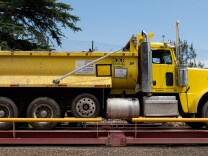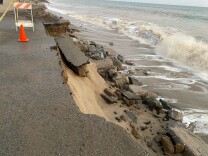
Next Up:
0:00
0:00
-
Listen Listen
Climate & Environment
Researchers found that in drier years, larger animals are more likely to head closer and closer to where people live.
Listen
4:05
Sponsored message
More Stories
-
Some of the hatchlings could be released into the wild as part of an international recovery program.
-
Here’s the science behind the summer solstice, including why its calendar date changes year to year.
-
Temperatures will reach the low 100s in the Inland Empire.
-
Residents are seeing trucks with Army Corps markings far from any sites where fire debris is allowed to go. Here’s what we figured out.
-
California could lose billions in highway dollars for failing to meet federal air standards.
-
Sunday is the warmest day of the week, but the heat will stick around.
-
Copenhagen is expected to receive 30% more rainfall by the end of the century. The city is responding with a massive long-term adaptation plan.
-
After years of complaints, officials aim to close loopholes to address pollution from aggregate recycling facilities, which process concrete, asphalt and similar material for reuse.
-
Trump signed three measures revoking California's waivers for rules that clean up cars and trucks. California and 9 other states immediately sued.
-
Climate.gov is the main source of timely climate-related information for the public. It will stop publishing new information because the Trump administration laid off everyone who worked on it.
-
The Trump administration plans to get rid of all limits on climate-warming pollution from the nation's fossil fuel power plants. Fossil fuel interests hailed the proposal, which likely faces legal challenges from environmental groups.
-
Insurance costs are soaring, and coverage is hard to find in some parts of the United States. Communities say insurers are ignoring their efforts to confront the problem.
The heaviest rainfall fell overnight Thursday into Friday morning in the L.A. and Ventura counties with continued showers into the weekend.
Support your source for local news!
In case you missed it
-
911 recordings obtained by LAist shed light on why and how emergency planning continues to leave people with disabilities behind.
-
LAist investigates illicit dumping at three Antelope Valley sites.
-
An LAist investigation found toxic heavy metals in samples of fire retardant collected from the Palisades, Eaton and Franklin fires. Here's what that means.
More Stories
-
Drought and other climate impacts will only worsen if global gas emissions aren’t cut, the report says.
-
Climate change costs tens of billions of dollars each year, hurts Americans' health and disrupts everyday life, including how we work, eat, play and mourn, according to a major new assessment.Listen 3:31
-
Today will be mostly sunny and dry, but come tomorrow the rain event is expected to begin.
-
Today and tomorrow will be partly cloudy and dry, but come Wednesday, rain is in the forecast.
-
After losing their home, Charles Brooks and his family chose to rebuild, and helped hundreds of others do the same.
-
Warmer waters can mean more rain and snow.
-
Improvements in emergency messaging and quicker reactions from helicopters may help.
-
New research finds that "beneficial" fires can cut the risk of high intensity blazes by 64 percent.
-
Los Angeles's famous mountain range is suffering from things like over-tourism, trash production, and water quality, says Fodor's "No List."
-
The county is looking into ways to preserve its beaches from coastal erosion, including planting native vegetation on sand dunes and transporting sediment from reservoirs downstream to beaches.




































